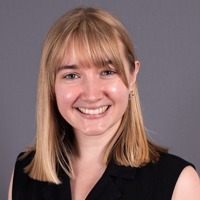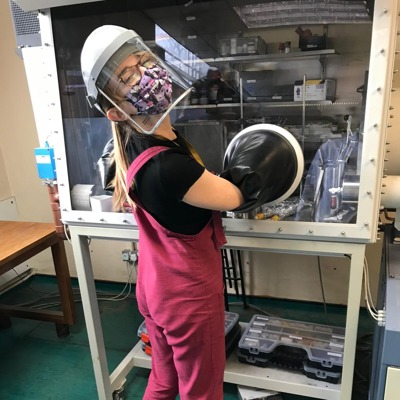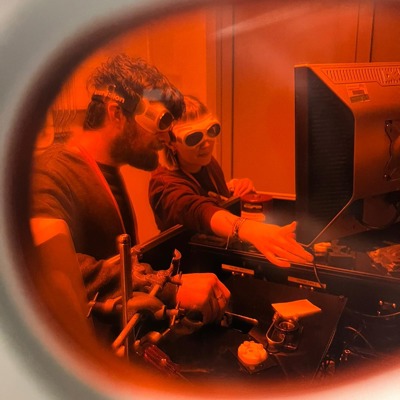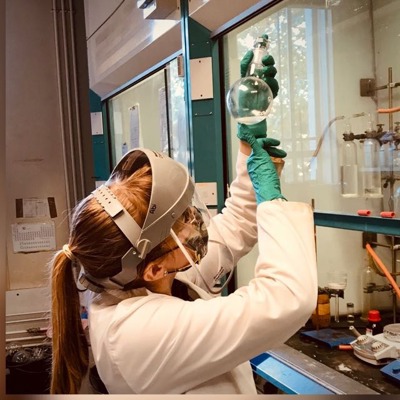
Abi Frith
Senior Research Associate at Lancaster University
Keep asking questions and be brave enough to seek out those with the answers!
About Abi...
Who am I?
"My personality types are coordinator, manager and quality controller, which I feel fit my personality and job role perfectly. A coordinator is organised, provides a service and can deliver what people need, works well with others, willing to help when needed, patient and compassionate and can get things done on time and budget. Working as a researcher in a chemistry lab this rings true, as I am coordinating the smooth running of several reactions at a time, setting up reactions, working them up, analysing the products, all in tandem with other reactions. This work is then delivered under the supervision of the project’s principal investigator, whom I work with to develop ideas and experiments to move the project forward. I also help with PhD and Masters students undertaking their own projects which requires leadership (that manager personality type) and knowing when to help. As research is about reactions not working most of the time, it requires a high level of patience and resilience to constantly problem solve! As most practical research is independent this also requires a level of motivation, although there are plenty of opportunities for collaboration too. And then Quality Controller is to me a very important one, as scientific experiments require great attention to detail. In reactions which have several variables that can influence the reaction outcome, the controlled variables need to be in check to make reactions as repeatable as possible – not just for you to repeat but for the wider scientific community to repeat. I would rather spend a week prepping for a reaction that only takes a day to complete, than rush it in a couple of days to discover I can never get the same results again… With my work being mostly practical, control is also important to make sure we are as safe as possible in the lab."
What do I do?
"I am a Senior Research Associate in Chemistry at Lancaster University. I work alongside academics, PhD and Masters students conducting research in the chemistry labs. I am currently working to coordinate metal-based molecules to DNA for use as catalysts, which make industrial reactions more efficient. Each research group specialises in different research topics, which makes it really interesting when we come together to discuss ideas about our work and offer advice. Research groups consist of a principal investigator and usually research associates like myself and students studying for their PhDs, Masters and Bachelor’s degrees. This means we get to work individually on different aspects of the project and come together to work as a team, which I really enjoy. I also get to help supervise student projects, which I love, as teaching is a passion of mine. Research associates tend to have short contracts, which gives you the opportunity to work in several different settings with different groups, which widens your experiences and widens your community within chemistry. I most enjoy working in the lab, being able to do a practical, hands-on job and I love that I get to share the expertise and experiences I learn along the way with others. The starting salary for my role varies, depending on the university, the funding body funding your job and project, and your experience. After completing you PhD and whilst staying in research in academia, you are usually a Postdoctoral Research Associate, or a “post doc”, which I currently am. The traditional career trajectory includes completing numerous postdoctoral positions, before acquiring your own funding to be an independent research fellow at a university. The salary for a postdoc can start from anywhere between £34,000 - £39,000. These roles however are highly competitive and there are plenty of roles for chemists across the wider industrial sector, not just in academia, such as pharmaceuticals, agriculture, cosmetics, publishing, policy making - the list is endless!"
How did I get here?
"I went to secondary school in a small village between Doncaster and Scunthorpe in South Yorks/North Lincs called South Axholme Academy. Whilst at school I loved science and maths and thought I would go to do Medicine at university (because I didn't really know what else people did for a living with science). I got 11 A* and 1 A at GCSE and then went on to do my A-levels at John Leggott College in Scunthorpe, where I got AAA in Chemistry, Physics and Maths and an AS in Further Maths.I applied for Medicine at 4 different places, including Oxford and was rejected for all 4 without an interview. That hurt. But now I'm glad as I don't think Medicine was really for me, I just thought that was my only option to work in science and help people - I was wrong! I then used my final option to apply for Medicinal Chemistry at the University of Leeds, which I got.I LOVED my time at Leeds, I found my tribe at university and made two lifelong friends along the way. I got a First in my Medicinal Chemistry BSc and applied again for Medicine. Whilst juggling labs, exams and reports I took 3 entrance exams and reapplied for Medicine - and didn't get in, again.I realised that I didn't need to get into Medicine to make me happy and I was really enjoying learning about how chemistry can help people around us and develop drugs for cancer and other diseases. So I stayed for my Masters in Chemical Biology and Drug Design and LOVED being in the lab and designing metal-based drugs for cancer therapies.With my love for lab work I applied for a PhD at Leeds with one of my lecturers and spent 4 yrs working on silver molecules (called \"complexes\") for use as anticancer drugs and catalysts (to make reactions more efficient). I completed my PhD and became a Doctor of Chemistry.During my PhD, I worked as a science and maths tutor and drove home every weekend to work in my parents’ shoe shop.After my PhD I took a Research Associate position at the University of York, which is a type of postdoctoral researcher (as I am working in a position after completing a PhD, I am post-doctoral training). I would work in a lab like I do now and supervise and manage PhD and Masters students in the lab. During this job I synthesised catalysts using electrochemistry, with metals that are more sustainable (such as manganese).I then moved to my current position at Lancaster University as a Senior Research Associate."
The life I live
"I am a Yorkshire chemist who has crossed the Pennines to live in Lancashire after living in Yorkshire all my life! I live in a beautiful little house on the edge of the sprawling countryside and love having all my friends and family around for big walks and cosy evenings in.After moving 11 times in the past 10 years for studies and work at universities, I'm really enjoying settling down in Lancaster. I live between the Lakes, the Peak District and the Forest of Bowland, so I enjoy getting out in nature and enjoying my surroundings. I love hiking and trail running, so my friend and I are looking into orienteering as our next challenge!"
My typical day
"I get into work for 8am and have a quick cuppa whilst I prep for my reactions that day - such as checking my safety sheets and lab book. I then head to the lab around 8:30am and start setting up my reactions. In the morning, I have to switch on my vacuum pump for a while before I can use it as it takes a bit of time to draw air into the pump to flush out any unwanted solvents. I go down to the outside dewars and fill our onion dewar (guess what that's shaped like...) with liquid nitrogen. I then switch on my line, add the liquid nitrogen and I'm good to go! This allows me to run reactions without any air or moisture present, instead I use nitrogen or argon gas to protect my reactions from degrading. I then spend the morning setting up my reactions, which can run for a few hours or a few days! Hopefully I get these on by lunchtime, get a bite to eat whilst listening to a podcast and head back to the lab!In the afternoon the reactions that are finished are worked up - using separation techniques such as filtering, recrystallising and liquid separation. We then have to analyse our products, which can be anything from gooey brown messes to pretty pink crystals! We use lots of techniques for this which I am happy to talk to you about.Depending on my results, I either repeat a reaction to check my method was reliable, change an independent variable like concentration, mass, temperature, time, pH, or move on to another reaction. I spend the rest of the afternoon writing up my results from the day's reactions and planning tomorrow's reactions - which involves checking how safe the chemicals are.My work involves developing a variety of molecules (called “complexes”) with a gold centre surrounded by different organic molecules (called “ligands”). In future work these will be bound to a type of DNA called i-motif DNA and tested for their anticancer activity and their ability to work as catalysts to make industrial reactions more efficient. Currently I am focusing on making the organic ligands as diverse as possible so we can test a wide range of gold complexes.I also supervise PhD and Masters students in the lab, so I make sure I check on them throughout the day to see if they need any help with their projects too.I then finish my day creating a plan for tomorrow and walk home listening to a podcast or ringing my friends."
My qualifications
"GCSEs: 11 A* and 1 A (including Triple Science, Further Maths, French, RE, Psychology, English, English Lit)A-levels: AAA in Chemistry, Physics and Maths and an AS in Further MathsFirst in Bachelors of Science (BSc) in Medicinal ChemistryDistinction in Masters of Science (MSc) in Chemical Biology and Drug DesignPhD in Chemistry in \"Silver N-Heterocyclic Carbenes for Biomedical and Catalytic Applications\""
Abi's Photos






